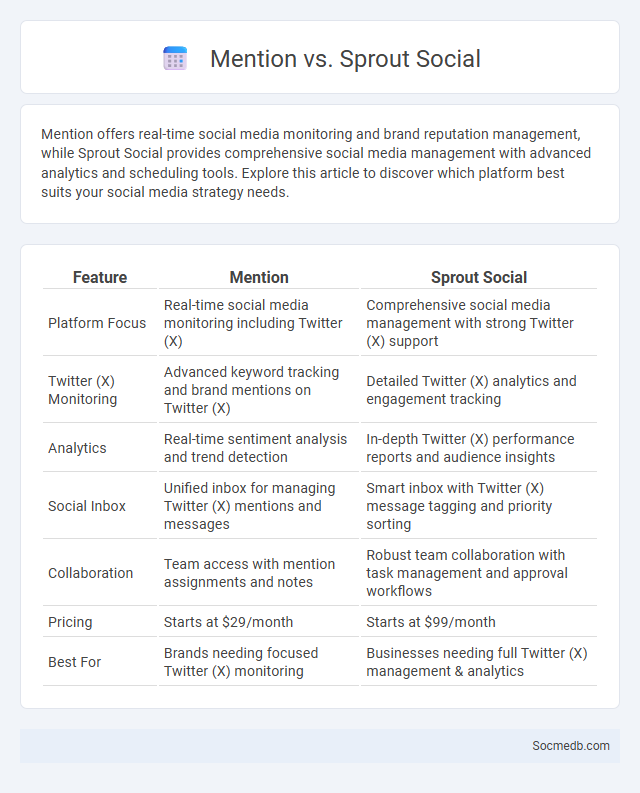
Photo illustration: Mention vs Sprout Social
Mention offers real-time social media monitoring and brand reputation management, while Sprout Social provides comprehensive social media management with advanced analytics and scheduling tools. Explore this article to discover which platform best suits your social media strategy needs.
Table of Comparison
| Feature | Mention | Sprout Social |
|---|---|---|
| Platform Focus | Real-time social media monitoring including Twitter (X) | Comprehensive social media management with strong Twitter (X) support |
| Twitter (X) Monitoring | Advanced keyword tracking and brand mentions on Twitter (X) | Detailed Twitter (X) analytics and engagement tracking |
| Analytics | Real-time sentiment analysis and trend detection | In-depth Twitter (X) performance reports and audience insights |
| Social Inbox | Unified inbox for managing Twitter (X) mentions and messages | Smart inbox with Twitter (X) message tagging and priority sorting |
| Collaboration | Team access with mention assignments and notes | Robust team collaboration with task management and approval workflows |
| Pricing | Starts at $29/month | Starts at $99/month |
| Best For | Brands needing focused Twitter (X) monitoring | Businesses needing full Twitter (X) management & analytics |
Introduction to Social Listening Tools
Social listening tools analyze vast amounts of social media data to identify trends, sentiment, and customer feedback relevant to Your brand. These tools leverage AI-driven algorithms to monitor conversations across platforms like Twitter, Instagram, and Facebook in real-time. Using social listening effectively helps you gain actionable insights for improving marketing strategies and customer engagement.
Overview: Mention vs Sprout Social
Mention and Sprout Social are leading social media management tools offering robust features for brand monitoring and audience engagement. Mention excels in real-time social listening and competitor analysis across multiple platforms, helping businesses track brand reputation efficiently. Sprout Social provides comprehensive social media scheduling, analytics, and customer relationship management, making it ideal for teams focused on data-driven marketing and customer support.
Core Features Comparison
Social media platforms differ significantly in their core features, including content types, user interaction methods, and privacy settings. Visual-centric apps like Instagram prioritize image and video sharing, while Twitter emphasizes real-time text updates and trending topics. Understanding these differences helps you choose the platform that best suits your communication style and privacy needs.
Social Listening Capabilities Analyzed
Social listening capabilities analyzed through advanced AI tools enable businesses to monitor brand mentions, customer sentiment, and emerging trends across multiple social media platforms in real-time. Your ability to gather actionable insights from these data streams helps refine marketing strategies, manage reputation, and enhance customer engagement effectively. Leveraging semantic analysis and natural language processing ensures precise understanding of context and emotion behind conversations to drive better decision-making.
Pricing and Subscription Models
Social media platforms offer diverse pricing and subscription models tailored to different user needs, ranging from free basic access supported by ads to premium subscriptions with ad-free experiences and exclusive content. You can choose plans that include features such as enhanced privacy controls, advanced analytics, or priority customer support, according to your preferences and budget. Understanding these models helps maximize value while ensuring the best user experience on platforms like Facebook, Instagram, Twitter, and LinkedIn.
User Interface and Experience
A well-designed social media user interface enhances Your interaction by providing intuitive navigation, clear visuals, and fast response times that keep users engaged. Effective user experience strategies prioritize personalized content feeds, seamless integration of multimedia, and accessible features across devices to boost satisfaction and retention. Optimizing these elements leads to increased user activity, longer sessions, and stronger community connections on the platform.
Integration with Other Platforms
Social media platforms increasingly emphasize integration with other digital services to streamline user experiences and enhance connectivity. Features such as single sign-on (SSO), cross-platform sharing, and API integrations enable seamless interaction between social networks, e-commerce sites, and productivity tools. Effective integration boosts user engagement, data synchronization, and marketing efficiency across diverse online environments.
Reporting and Analytics Strength
Social media platforms offer robust reporting and analytics tools that provide real-time insights into audience engagement, reach, and content performance. These capabilities enable businesses to track key metrics such as impressions, click-through rates, and conversion rates to optimize marketing strategies. Enhanced data visualization and customizable dashboards assist in making data-driven decisions that improve overall social media ROI.
Pros and Cons: Mention vs Sprout Social
Sprout Social offers robust social media management tools with features like advanced analytics, scheduling, and customer engagement, making it ideal for businesses seeking comprehensive oversight of their online presence. You benefit from its user-friendly interface and collaboration capabilities, which streamline content planning and team communication. However, Sprout Social's higher cost and potential learning curve may not suit smaller businesses or individual users looking for a more budget-friendly, straightforward platform.
Which Tool is Best for Your Business?
Choosing the best social media tool for your business depends on factors like target audience, content style, and marketing objectives. Platforms like Facebook and Instagram excel in visual content and broad reach, while LinkedIn is ideal for B2B engagement and professional networking. You should analyze your business needs and target demographics to select a tool that maximizes engagement and ROI.
 socmedb.com
socmedb.com